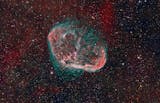Optolong L-Ultimate Filter
It’s about a 3nm dual band designed to drastically reduce the effect of light pollution, the 3nm isolates the nebulae’s emissions into H-Alpha (red) and OIII (green-blue). It blocks light pollution, maximizes the signal from nebulae, and darkens the sky background. It also blocks artificial light from mercury vapor lamps, high and low pressure sodium vapor lights, and unwanted natural light caused by the emission of neutral oxygen in our atmosphere. …
Opotlong L-Ultimate Introduction
It’s about a 3nm dual band designed to drastically reduce the effect of light pollution, the 3nm isolates the nebulae’s emissions into H-Alpha (red) and OIII (green-blue). It blocks light pollution, maximizes the signal from nebulae, and darkens the sky background. It also blocks artificial light from mercury vapor lamps, high and low pressure sodium vapor lights, and unwanted natural light caused by the emission of neutral oxygen in our atmosphere. Maximizes the transmission of the main emission lines of the nebula in OIII (496nm and 500nm) and H-alpha (656nm). Used with DSLR, color/MONO CMOS and CCD, however, this filter is not suitable for fast ratio systems.
The advantage of L-Ultimate is that it only passes through the emission lines OIII(500.7nm) and Ha(656.3nm), in which case all other light pollution emission lines are eliminated so that only the emission and reflection signals of the nebula are captured during imaging. Therefore, the sky background of the image is darker, and the contrast between the nebulae and the signal-to-noise ratio are improved to the greatest extent. In heavy light pollution areas, the product can also selectively filter light pollution and clutter signals through the emission lines of nebulae, and finally avoid the impact of light pollution on astrophotography.
It is different from the series of dual-narrowband L-eNhance and L-eXtreme in that L-Ultimate is a dual-3nm bandwidth filter that only passes through Ha and OIII emission lines. You will get a darker sky background, more contrast of the image and the suppression on stars. L-Ultimate has also been optimized in terms of halo performance, so that there is no obvious halo when shooting on a bright star object.
Features
| Sbustrate |
optical glass |
| FWHM |
OIII 3nm Ha 3nm |
| Blocking range |
300-1000nm |
| Blocking |
>OD4 |
| Surface quality |
60/40 |
| Transmitted Wavefront RMS: |
λ/4 |
| Parallelism |
30seconds |
L-Ultimate Filter Performance
Nebulae Flying Bat and Squid in the constellation of Cepheus.
Squid (OU4) is a region characterized by very weak OIII emission with a bipolar shape reminiscent of planetary nebulae. Recent studies suggest that Ou4 is actually internal to SH2-129 (the H-alpha-emitting flying bat nebula, reddish in the image), generated by a triple star system located in the center (HR8119, visible as the bright star in the center of Squid).
The distance from our solar system is estimated at about 1300 light years.
The lights were taken over 2 years, with total integration equal to 29 hours (21.5 for OU4 and 7.5 for SH2-129).
This project gave me the opportunity to test the Omegon veTEC 571C camera and the Optolong L-Ultimate filter with excellent results for both products.
Lights: 258x300s (Ou4, L-Extreme) + 30x900s (Sh2-129, L-Ultimate)
Telescope1: Apocromatic TS PhotoLine 102 f/5,6 Triplet FPL53
Telescope2: Takahashi FS60CB @ f/4.2
Camera1: ZWO ASI 294mc Pro
Camera2: Omegon veTEC 571C
Mount: Skywatcher AZ-EQ6 GT
Filters: Optolong Astronomy Filter L-Extreme + L-Ultimate
Processing: DeepSkyStacker, Photoshop CC, PixInsight
Credit:Tommaso Massimo Stella (Italy)

Objects: Veil Nebula
Camera: QHY168C
Telescope: Pentax 100 SDUF II F/4
Mount: Skywatcher AZ-EQ5GT
Filter: Optolong 3nm L-Ultimate Filter
Frames: 13 x 240sec lights
Credit:Tommy Lim KW (Malaysia)

Sh2-132 The Lion nebula
Prosegue il test del filtro Ultimate della Optolong Astronomy Filter
96 light da 300 sec
No dark no flat
Credit:Andrea Maggi

Supernova remnant W63
Supernova remnant W63 glows like a faint cosmic smoke ring along the plane of the Milky Way toward the northern constellation Cygnus. Its spectral appearance is reflected in the region’s rich complex of interstellar clouds and dust by an eerie blue glow, captured with Optolong’s new dual band 3nn filter!! L-Ultimate…
Canon Eos MK IV mod by CentralDS 20×900″ ISO3200
Optolong L-Ultimate
Skywatcher AZ-GTI mount
Guide camera ZWO ASI 120MM
Credit:José Jiménez (Spain)

Sharpless 129
Canon Eos MK IV mod by CentralDS 30×900″ ISO3200
Optolong L-Ultimate
Credit:José Jiménez (Spain)

NGC6888 HOO Version
Telescope ASKAR 500
Camera Zwo ASI 6200
Filter Optolong 3nm
Software Voyager
Credit:Andrea Maggi (Italy)

NGC7635 & Sh2-157
Due ore stanotte da Saint Barthelemy
Telescopio Askar 80 PH
Camera Asi 2600
Filtro Optolong Ultimate
Credit:Andrea Maggi (Italy)

Technical Specifications
Reference Spectrum

※This curve is only for reference, and is not used as the final product data.
How to read the chart?
▲The horizontal axis is the Wavelength in Nanometers(nm).
▲The vertical axis is transmission in %.
| Sbustrate |
optical glass |
| FWHM |
OIII 3nm Ha 3nm |
| Blocking range |
300-1000nm |
| Blocking |
>OD4 |
| Surface quality |
60/40 |
| Transmitted Wavefront RMS: |
λ/4 |
| Parallelism |
30seconds |
Coating Technology
·Multi-layers anti-reflection coating
·Non-cementing optical substrate coating
·Optolong filter adopts precision coating based on Ion-assisted deposition coating technology for durability and resistance to scratching, as well as stability on CWL(central wavelength) no deviation affected by temperature change.
·Planetary rotation system offers precision and homogeneity of coatings ensuring high value on transmission of pass-band and Optical density of off-band.
In the Box
Filter
Manuals & Warranty
Optolong 3-Years Warranty





















